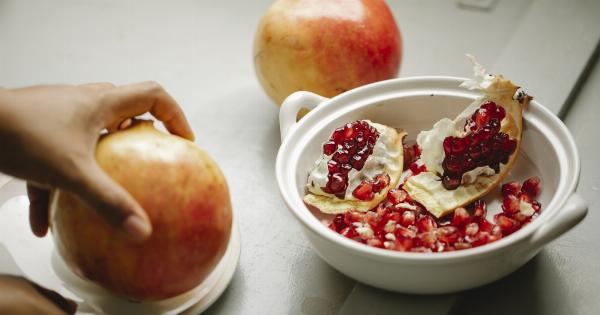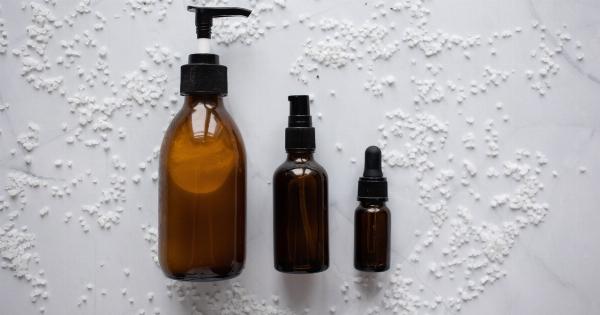Bloating is a common condition that most of us have experienced at some point in our lives. It refers to the feeling of fullness, tightness, or swelling in the abdominal area.
It can be incredibly uncomfortable and can even affect our self-confidence and daily activities. The good news is that there are several ways to calm your tummy down and find relief from bloating.
Watch What You Eat
One of the most common causes of bloating is the food we consume. Certain foods can be harder for your body to digest, leading to bloating and discomfort. If you’re prone to bloating, it might be worth taking note of the foods that trigger it.
Common culprits include:.
- Beans and lentils
- Cruciferous vegetables like broccoli, cauliflower, and cabbage
- Carbonated drinks
- Artificial sweeteners
- Fatty and fried foods
- Processed snacks
- High-fat dairy products
By being mindful of your diet and avoiding or minimizing the consumption of these foods, you may be able to reduce bloating significantly.
Eat Slowly
In today’s fast-paced world, we often find ourselves rushing through meals. However, eating too quickly can lead to the intake of excess air, which can contribute to bloating.
Additionally, not thoroughly chewing your food means that your digestive system has to work harder to break it down, potentially leading to bloating.
Take the time to savor your meals, chew your food properly, and enjoy every bite. By doing so, you’ll not only support digestion but also reduce the chances of feeling bloated afterward.
Stay Hydrated
Drinking enough water is essential for maintaining overall health, including good digestion. When your body is dehydrated, it tends to hold on to water, leading to bloating and water retention.
Aim to drink at least 8 glasses of water per day to stay adequately hydrated and prevent bloating.
Additionally, you could infuse your water with lemon or cucumber slices for a refreshing twist. These natural ingredients also offer mild diuretic properties, promoting urine production and reducing the risk of bloating.
Avoid Carbonated Drinks
Carbonated beverages, such as sodas and sparkling water, can introduce excessive amounts of gas into your digestive system, leading to bloating.
The bubbles in these drinks can get trapped in your stomach or intestines, causing discomfort and a distended belly.
If you’re experiencing bloating, it’s best to avoid carbonated drinks altogether and opt for still water or herbal tea as a refreshing alternative.
Include Probiotics in Your Diet
Probiotics are beneficial bacteria that can help improve gut health and digestion. They can be found in various fermented foods, such as yogurt, kefir, sauerkraut, and kimchi.
Consuming these foods regularly can help maintain a healthy balance of gut bacteria, reducing the risk of bloating and other digestive issues.
If you’re not a fan of fermented foods, you can also consider taking a probiotic supplement. Just make sure to consult with your healthcare provider before starting any new supplement regimen.
Avoid Overeating
Eating large meals, especially in one sitting, can put a strain on your digestive system and contribute to bloating. When you consume excessive amounts of food, your stomach expands, causing discomfort and a bloated feeling.
Instead of having three large meals per day, try breaking them down into five or six smaller meals. This not only aids digestion but also ensures that you’re providing your body with a steady supply of energy throughout the day.
Manage Stress Levels
Chronic stress can wreak havoc on your digestive system and contribute to bloating. When you’re stressed, your body enters the “fight-or-flight” mode, diverting resources away from digestion and causing other physiological changes.
To help calm your tummy, it’s essential to manage your stress levels effectively.
Incorporating stress-reducing activities into your daily routine, such as meditation, yoga, deep breathing exercises, or spending time in nature, can have a significant impact on your digestive health.
Exercise Regularly
Maintaining an active lifestyle not only benefits your overall health but also supports digestion and reduces bloating.
Exercise helps stimulate the muscles of the digestive tract, promoting regular bowel movements and preventing food from lingering in your system for too long.
Engage in activities that you enjoy, such as walking, jogging, swimming, or dancing, for at least 30 minutes every day. This will not only aid digestion but also help alleviate bloating symptoms.
Consider Food Intolerances
Sometimes, bloating can be a sign of food intolerances or sensitivities. Common culprits include lactose, gluten, and certain types of sugars, such as fructose.
If you suspect that you have a food intolerance, consider keeping a food diary to track your symptoms after consuming particular foods.
Elimination diets, under the guidance of a healthcare professional, can help identify specific food triggers and allow you to make necessary dietary changes to alleviate bloating.
Avoid Chewing Gum
Chewing gum may seem harmless, but it can actually contribute to bloating. When you chew gum, you take in excess air, which can become trapped in your digestive system.
Additionally, many chewing gums contain artificial sweeteners that can cause bloating in some individuals.
If you’re prone to bloating, it’s best to steer clear of chewing gum and opt for mints or natural breath fresheners instead.
When to Seek Medical Advice
While occasional bloating is normal and can often be managed with lifestyle changes, persistent or severe bloating may require medical attention.
If you’re experiencing the following symptoms alongside bloating, it’s crucial to consult with a healthcare professional:.
- Severe abdominal pain
- Persistent diarrhea or constipation
- Unexplained weight loss
- Blood in the stool
- Severe heartburn or acid reflux
These symptoms could indicate an underlying medical condition that requires diagnosis and appropriate treatment.
Conclusion
Bloating can be a frustrating and uncomfortable condition, but with the right lifestyle changes and dietary adjustments, you can find relief.
By being mindful of what you eat, eating slowly, staying hydrated, and managing stress levels, you can support your digestive system and minimize bloating.
If your bloating persists or is accompanied by other concerning symptoms, it’s always best to seek medical advice. Remember, everyone’s body is unique, so finding what works best for you may require some trial and error.
Patience and consistency are key as you navigate your way to a happier, calmer tummy.































